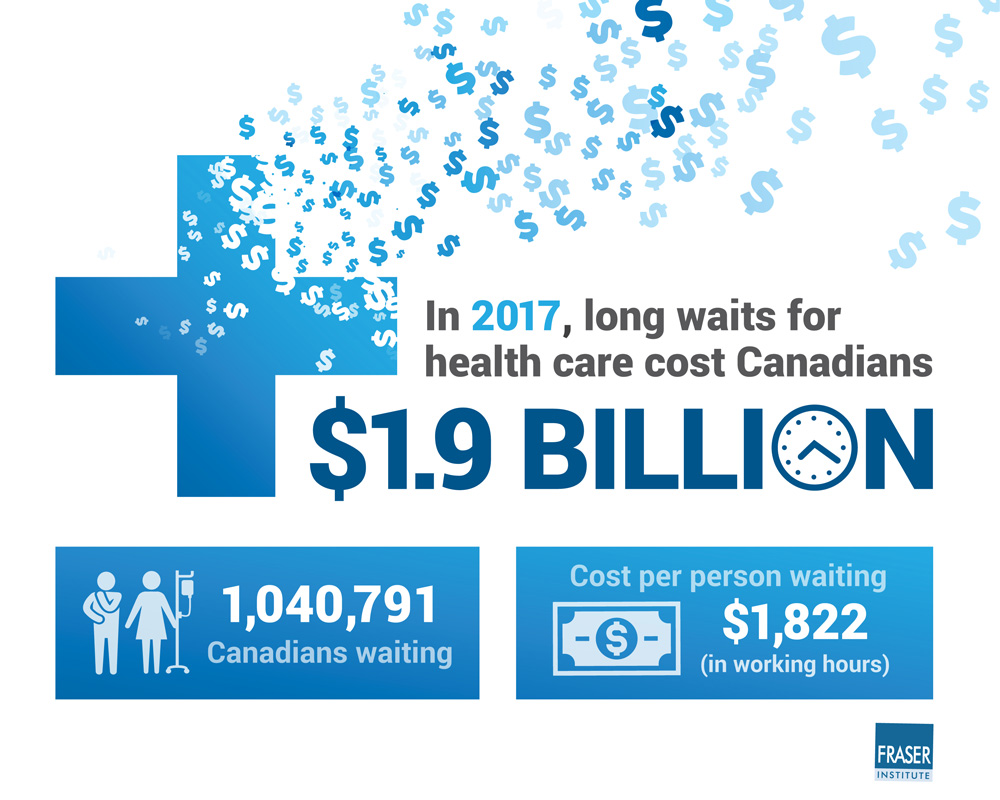Study
| EST. READ TIME 1 MIN.One million Canadians waited for medical treatment in 2017, costing $1.9 billion in lost wages
The Private Cost of Public Queues for Medically Necessary Care, 2018
Summary
- One measure of the privately borne cost of wait times is the value of time that is lost while waiting for treatment.
- Valuing only hours lost during the average work week, the estimated cost of waiting for care in Canada for patients who were in the queue in 2017 was about $1.9 billion. This works out to an average of about $1,822 for each of the estimated 1,040,791 Canadians waiting for treatment in 2017.
- This is a conservative estimate that places no intrinsic value on the time individuals spend waiting in a reduced capacity outside of the work week. Valuing all hours of the week, in-cluding evenings and weekends but excluding eight hours of sleep per night, would increase the estimated cost of waiting to $5.8 billion, or about $5,559 per person.
- This estimate only counts costs that are borne by the individual waiting for treatment. The costs of care provided by family members (the time spent caring for the individual waiting for treatment) and their lost productivity due to difficulty or mental anguish are not valued in this estimate. Moreover, non-monetary medical costs, such as increased risk of mortality or ad-verse events that result directly from long delays for treatment, are not included in this estimate.

Share
-

Bacchus Barua
Director, Health Policy Studies, Fraser Institute
Bacchus Barua is Director of the Fraser Institute’s Centre for Health Policy Studies. He completed his BA (Honours) in Economicsat the University of Delhi (Ramjas College) and received an MA in Economics from Simon Fraser University. Mr. Barua has conducted research on a range of key health-care topics including hospital performance, access to new pharmaceuticals, the sustainability of health-care spending, the impact of aging on health-care expenditures, and international comparisons of health-care systems. He also designed the Provincial Healthcare Index (2013), co-led the creation of Comparing Performance of Universal Health Care Countries (2016) and co-authored the Fraser Institute’s annual survey of wait times, Waiting Your Turn, for over a decade (2010–2022). In 2022, Bacchus was invited to provide testimony as part of a panel of witnesses for the House of Commons Standing Committee on Health (HESA). Mr. Barua is a frequent commentator on radio and television, and his articles have appeared in well-known news outlets including the National Post, Wall Street Journal, Globe and Mail, Maclean’s, and forbes.com.… Read more Read Less… -

Sazid Hasan
Sazid Hasan is a former economist at the Fraser Institute who worked on fiscal, health, and education policy. He received his M.A.in economics from Simon Fraser University. He also holds an M.S.S. and B.S.S. (honours), both in economics, from the University of Dhaka. He worked on his graduate project at the Research Data Centre of Statistics Canada, where he examined the impact of a tax credit on labour supply. He has presented his academic research at the annual conferences of Canadian Economics Association. His commentaries have appeared in the Vancouver Sun, Winnipeg Sun, and La Presse.… Read more Read Less…
Related Topics
Related Articles
AI could help solve Canada’s shortage of family doctors
By: Dr. Jehangir Appoo, Glen Sumner and Aria S. Appoo
Philpott should act on instincts and promote Dutch-style health-care reform in Ontario
By: Bacchus Barua and Mackenzie Moir
Canadians are ready for health-care reform—Australia shows the way
By: Bacchus Barua and Mackenzie Moir
Canadians want major health-care reform now
By: Mackenzie Moir